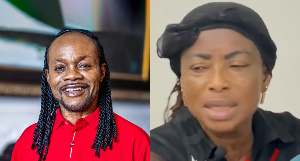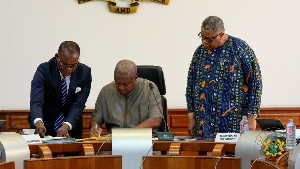Assembly Members in some muslim-dominated communities in the Kintampo Municipality, have appealed to the state agencies and human rights organisations, to collaborate in the fight against forced/early marriages.
According to the Assembly members, forced marriages were gaining alarming proportions in communities such as Kawumpe, Gurumpe, Cherinda, Babatokuma and Kadelso and other settlements, all within the Municipality.
The situation, they pointed out, was not only hindering girl-child education, but destroying the lives of many promising girls in the communities.
They stressed the need for collective efforts from all stakeholders to bring the situation under control.
Messrs Mathias Taasun, the Assemblyman for Kawumpe, Mohammed Abdul Aziz, Assemblyman for Babatokuma and Sulemana Bahidin, Assemblyman for Cherinda electoral areas, made the call when they addressed a meeting of the chiefs and people at Kawumpe.
The meeting was organised by the Mission of Hope Society (MIHOSO), in collaboration with Gender Studies and Human Rights Documentation Center, a Non-Governmental Organization (NGOs).
It formed part of a two-year project of the two NGOs, with funding from the European Union (EU), and was being implemented to help reduce forced and early marriages in the Municipality and the Nkoranza North District of Brong-Ahafo Region.
According to the assembly members, most of the communities in the area regarded forced and early marriages as customary, and as a result many opinion leaders had no interest to help reduce them.
They observed that after the victims, mostly between 14 and 15 years, had given birth to two and three children, their husbands lost interest in them and began to maltreat them.
Mr Taasun observed that any teenager who resisted attempt to go into the practice was sometimes considered an outcast, and molested by their parents and other relatives.
Citing an instance where a class four pupil in one of the communities was kidnapped and sent to her husband in Accra, Mr Aziz said if pragmatic steps were not taken, the situation would be out of hand.
Mrs Gloria Babayara, the Kintampo Municipal Girl Child Education Coordinator, noted that the school drop-out rate among girls in the Municipality continued to increase, because of teenage pregnancy, which according to her, was as a result of forced and early marriages.
She said even though girl-child clubs had been formed in almost all the basic schools in the areas where the situation was alarming, as a means to advocate against it, the practice continued to increase.
Mrs Babayara said it was unfortunate that in most of the cases the victims' parents played key roles in luring or forcing their children into the practice.
Mr Chrysantus Suglo, the Kintampo Municipal Director of the Commission on Human Rights and Administrative Justice (CHRAJ), disclosed that from January to March this year, the Commission recorded six cases of forced and early marriages within the Municipality, while 26 cases were recorded in 2014.
The commission was able to rescue nine of the victims, he added.
Mr Thomas Bernakuu, Director of Programmes of the MIHOSO, explained that the 90 Community-based Action Teams (COMBATs) and volunteers, established under the project, expected to end by the close of the year, would be supported by the NGO to continue their work.
He said the 1992 Constitution, as well as the Children’s Act, and other international conventions were against forced and early marriages, adding that the Constitution was superior and superseded any tradition or custom.
They, therefore, called for the prosecution of perpetrators of such acts.
Regional News of Tuesday, 12 May 2015
Source: GNA
Assembly members call for support to fight forced marriages

Entertainment

Daddy Lumba's 'ghost' is tormenting us – Aunt cries out
Opinions









